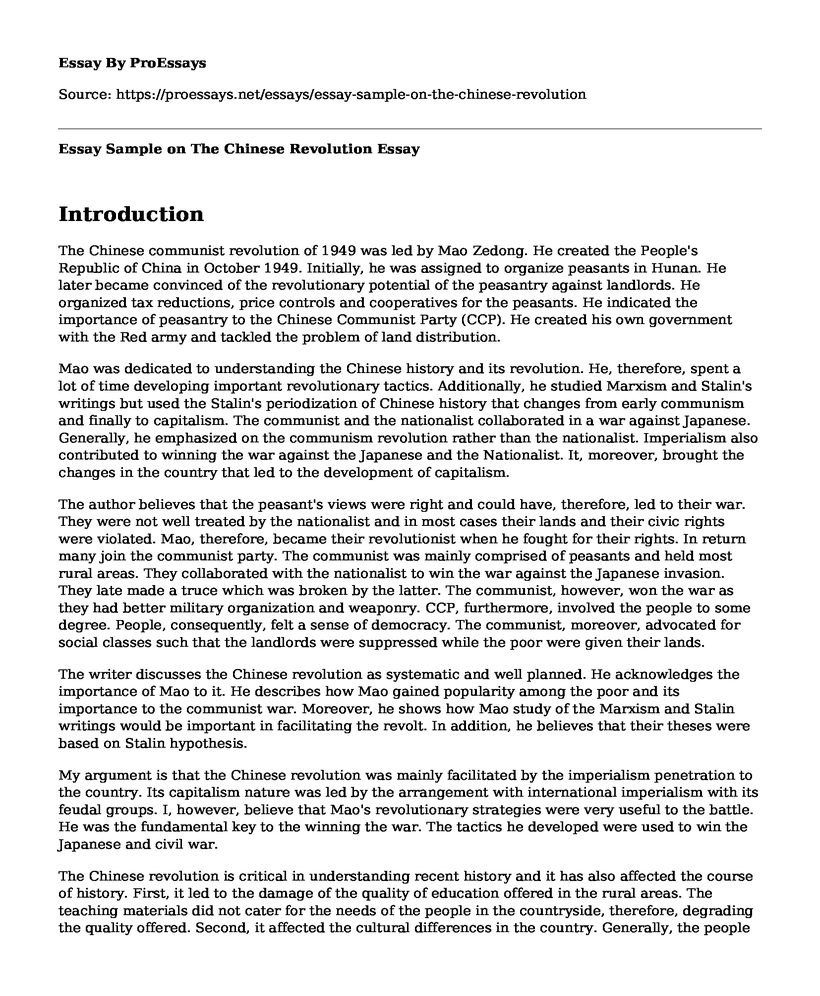Introduction
The Chinese communist revolution of 1949 was led by Mao Zedong. He created the People's Republic of China in October 1949. Initially, he was assigned to organize peasants in Hunan. He later became convinced of the revolutionary potential of the peasantry against landlords. He organized tax reductions, price controls and cooperatives for the peasants. He indicated the importance of peasantry to the Chinese Communist Party (CCP). He created his own government with the Red army and tackled the problem of land distribution.
Mao was dedicated to understanding the Chinese history and its revolution. He, therefore, spent a lot of time developing important revolutionary tactics. Additionally, he studied Marxism and Stalin's writings but used the Stalin's periodization of Chinese history that changes from early communism and finally to capitalism. The communist and the nationalist collaborated in a war against Japanese. Generally, he emphasized on the communism revolution rather than the nationalist. Imperialism also contributed to winning the war against the Japanese and the Nationalist. It, moreover, brought the changes in the country that led to the development of capitalism.
The author believes that the peasant's views were right and could have, therefore, led to their war. They were not well treated by the nationalist and in most cases their lands and their civic rights were violated. Mao, therefore, became their revolutionist when he fought for their rights. In return many join the communist party. The communist was mainly comprised of peasants and held most rural areas. They collaborated with the nationalist to win the war against the Japanese invasion. They late made a truce which was broken by the latter. The communist, however, won the war as they had better military organization and weaponry. CCP, furthermore, involved the people to some degree. People, consequently, felt a sense of democracy. The communist, moreover, advocated for social classes such that the landlords were suppressed while the poor were given their lands.
The writer discusses the Chinese revolution as systematic and well planned. He acknowledges the importance of Mao to it. He describes how Mao gained popularity among the poor and its importance to the communist war. Moreover, he shows how Mao study of the Marxism and Stalin writings would be important in facilitating the revolt. In addition, he believes that their theses were based on Stalin hypothesis.
My argument is that the Chinese revolution was mainly facilitated by the imperialism penetration to the country. Its capitalism nature was led by the arrangement with international imperialism with its feudal groups. I, however, believe that Mao's revolutionary strategies were very useful to the battle. He was the fundamental key to the winning the war. The tactics he developed were used to win the Japanese and civil war.
The Chinese revolution is critical in understanding recent history and it has also affected the course of history. First, it led to the damage of the quality of education offered in the rural areas. The teaching materials did not cater for the needs of the people in the countryside, therefore, degrading the quality offered. Second, it affected the cultural differences in the country. Generally, the people in the rural regions have upheld their cultures while those in the urban areas have eroded them. Third, it lead to China becoming a capitalist nation. Foreign imperialism brought about capitalism. In addition, it also led to an early maturity of social-political order to the country.
Conclusion
In conclusion, the revolution has been interpreted differently by various authors. Mao Zedong, generally, had a major influence in the communist war. Imperialism facilitated the revolt against the Japanese and later the nationalists. It further had a great impact to the history and the political order of the country later on leading to capitalism in the country.
Cite this page
Essay Sample on The Chinese Revolution. (2022, Dec 01). Retrieved from https://proessays.net/essays/essay-sample-on-the-chinese-revolution
If you are the original author of this essay and no longer wish to have it published on the ProEssays website, please click below to request its removal:
- Displacement of Syrian Women Due to the Syrian Civil War Annotated Bibliography
- Prince Henry Essay Example
- Essay on Ancient Civilization: Egypt
- Essay Sample on Admiral Chester Nimitz: Commander in Chief of the US Pacific Fleet
- Essay on KFC's Expansion in China: A Risky Yet Rewarding Opportunity
- Research Paper on Universities in China: Leveraging Information, Innovation and E-Learning
- Paper Sample on The Last Generation of Slavery: Booker T. Washington







